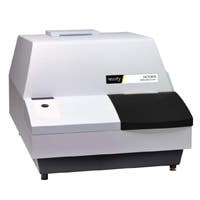Background
Biotin is part of the vitamin B complex that functions as a cofactor for four carboxylase enzymes in man. When biotin is covalently linked to a key lysine residue in the carboxylases, the enzymes are activated. When the carboxylase enzymes are degraded, biotinyl-lysine is produced. Biotinidase subsequently hydrolyzes biotinyl-lysine to release free biotin, allowing it to be recycled and made available for activating newly synthesized carboxylase enzymes. In the absence of normal biotinidase activity, the patient develops functional biotin deficiency and its clinical symptoms. Biotinidase deficiency is also known as late-onset multiple carboxylase deficiency, which distinguishes it from an earlier onset form caused by holocarboxylase synthetase deficiency.
Clinical
Newborns with biotinidase deficiency appear normal at birth. Biotin deficiency develops over time with clinical symptoms beginning at a few weeks to several years of age. If untreated, patients will develop metabolic ketoacidosis and organic aciduria. Symptoms include ataxia, hypotonia, developmental delay, conjunctivitis, skin rash and alopecia, seizures, hearing loss, breathing problems and optic atrophy. There is variable expression of these symptoms probably related to dietary biotin intake and the degree of residual biotinidase enzyme activity. Partial biotinidase deficiency appears as a milder disease with most patients exhibiting chiefly the cutaneous symptoms, particularly when the patient is under metabolic stress.
Testing
Newborn screening of biotinidase activity from dried blood spots can identify affected patients shortly after birth. Both complete and partial deficiencies can be detected. The diagnosis is confirmed by measuring biotinidase activity in serum or analyzing DNA to detect the most common genotypes. In clinically symptomatic cases, urine analysis by gas chromatograph/mass spectrometry will identify elevation of β-hydroxyisovalerate, lactate, β-methylcrotonylglycine, β-hydroxypropionate and methyl citrate. These build up due to the inactivity of the four biotin requiring enzymes.
Treatment
Biotinidase deficiency is treated with oral biotin supplementation, which prevents development of the clinical symptoms. Because the diagnosis and therapy of metabolic disorders is complex, the pediatrician is advised to manage the patient in close collaboration with a consulting pediatric metabolic disease specialist. It is recommended that parents travel with a letter of treatment guidelines from the patient’s physician.
Inheritance
This disorder most often follows an autosomal recessive inheritance pattern. With recessive disorders affected patients usually have two copies of a disease gene (or mutation) in order to show symptoms. People with only one copy of the disease gene (called carriers) generally do not show signs or symptoms of the condition but can pass the disease gene to their children. When both parents are carriers of the disease gene for a particular disorder, there is a 25% chance with each pregnancy that they will have a child affected with the disorder.






























